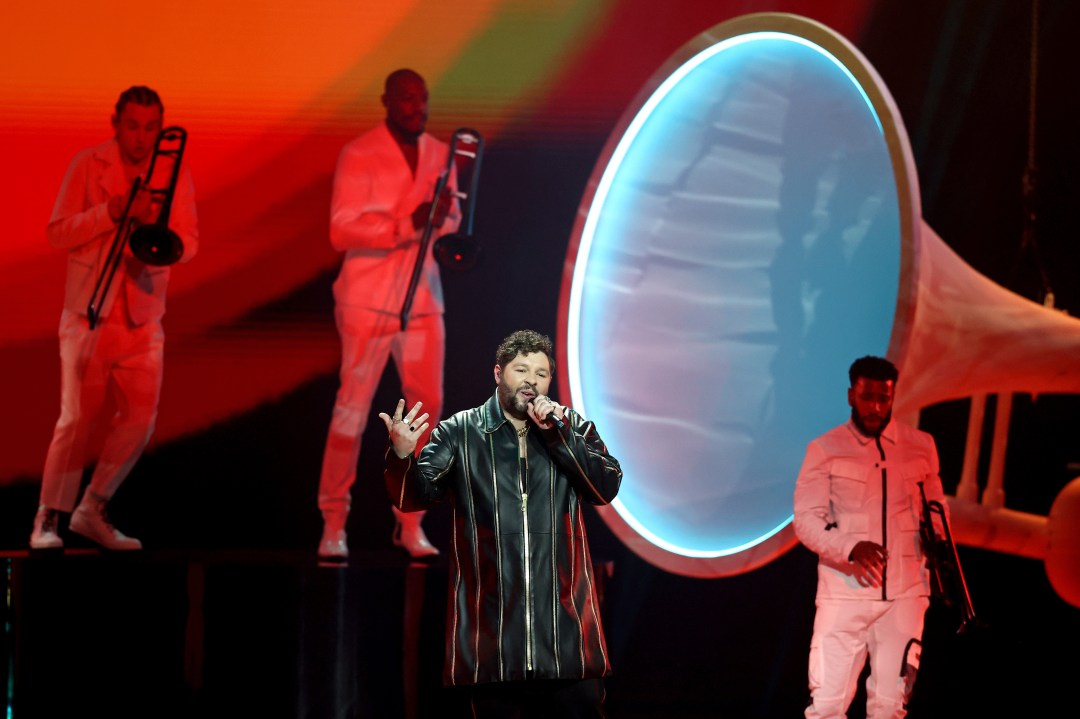Yet again, Britain’s Eurovision entry has come last getting nul points from tout le monde. Yet again, politics is being blamed – but wrongly. The UK was simply outsung and outclassed by smaller countries who made more effort. Eurovision has always been a collision between politics, music and culture. Winners game that system, coming up with an act that crosses dozens of linguistic and national boundaries. It’s tricky. But Britain stopped trying some time ago. The BBC chooses our entry and doesn’t bother with a contest. It also struggles to pick (and prep) Eurovision winners. As a result, every year, Britain sends some unprepared soul to perish on the world stage.
A strange, outraged jingoism usually follows Britain’s Eurovision flops. The voting is obviously political, we say. The whole show is trash, why do we even compete? But let’s look at some basics. This year, the BBC sent in last year’s contestant (most other countries went to the trouble of refreshing). James Newman is a charismatic and talented songwriter, who has little experience performing. He was good. But being good is not enough for Eurovision, now the world’s most-watched cultural event with millions voting. To wow this multinational, multilingual, multicultural crowd takes the kind of imagination and effort that the BBC is unwilling or unable to provide. Its speciality is news and drama: schlager is not its thing.
It wasn’t Newman’s fault. He was hopelessly under-equipped with underwhelming choreography and a dismal set. Even Bulgaria’s set was in a different league to ours. Iceland has the same population as Clapham and its entry managed a well-deserved top five.
Iceland has a smaller population than Clapham and its entry managed a well-deserved top five
The BBC pays so much money to Eurovision that the UK entry goes straight to the final: most others have to go through semi-finals. This competition-dodging ultimately leaves the UK act unprepared. The bottom three last night – Spain, Germany and UK – are all members of the ‘big five’ who skip the semis. None of their entries this year would have got through on their on merit, and this is why they stuck out at the bottom of the table last night. Their very presence in the final was an anomaly, a con, a fix. None of these bottom three got any points from the public vote.
The first time James Newman had the chance to perform in front of a live audience on live television was last night. So he was underprepared and didn’t stand a chance. The BBC always skimp on staging and choreography – and that neglect showed. Newman was up against acts who had run the televoting gauntlets of home selection then the ESC semis. By last night, they were pretty battle-hardened.
Italy’s winning act only got there after a five-episode, 26-entry televised talent show. The BBC lays on none of that. It can’t be bothered. Far easier to skip the whole process, then blame politics when we crash and burn. But can we blame politics for the poor showing of the UK entries in the UK? Italy’s entry hit no. 2 in its charts. The UK entry didn’t make the Top 40.
ITV is also a member of the Eurovision Broadcasting Union, the organisation behind Eurovision: maybe it could choose the UK entry next year. The BBC has picked duds for 20 years now – quite a feat given how much natural musical talent we have. We’re pretty much the only country in Europe to be a net exporter of music. We have plenty of talent, but it’s hard for any musical politburo to identify the nature or location of that talent. Picking musical winners can happen (the Dutch did it in 2019). But Italy’s entry – a retro ‘new metal’ band with a Danish name – was a typical example of mass voting promoting something a panel of experts would never have gone for.
Eurovision has always reflected and anticipated social trends. This year, we see a return to national identity (only one of the top four was sung in English). Winning acts often articulate the historical moment. The world has had enough of sad ballads or bland disco music that you can watch on Zoom. Italy’s raucous, retro, audience-revving entry ended up a good corrective t lockdown – perhaps why it stormed the popular vote (the more polished French and Swiss entries did best in the jury votes) .
The Dutch provided a real-live audience last night: 3,000 fans. Quite a feat, given that the Netherlands is more locked down than we are. Its stadium was a Covid hospital this time last year. From this, the Di revived the world’s biggest musical contest. Normal life is coming back, and musical competition is brutal. The truth is that Britain is teeming with musical talent and could win every year if we took it as seriously as – say – Malta. And until Britain makes a proper effort, we can’t be surprised to finish behind the countries who do.







Comments